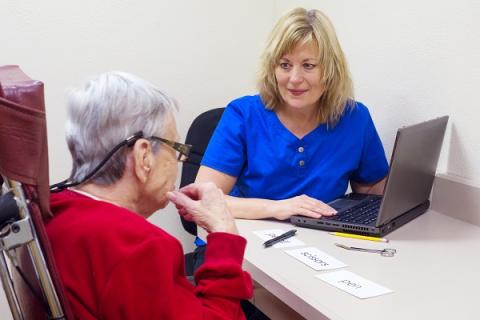Be An Aphasia-Friendly Communicator
Aphasia is a communication disorder that affects a person’s ability to understand, produce, and process language. It is usually caused by damage to the language centers of the brain, often resulting from a stroke, brain tumor, traumatic brain injury, or neurological conditions such as dementia. Actor Bruce Willis publicly announced his aphasia symptoms last year, and later his family confirmed that he was eventually diagnosed with frontotemporal dementia. Aphasia is a common condition that affects more than two million Americans.
The specific symptoms and severity of aphasia can vary depending on the location and extent of brain damage. Common symptoms include difficulty finding words, speaking in short or incomplete sentences, comprehension problems, trouble reading or writing, and challenges with gestures or nonverbal communication. Aphasia can be a permanent or temporary condition.
Treatment for aphasia typically involves a combination of speech-language therapy, counseling, and supportive strategies. These supportive strategies can include working with pictures, using pen and paper, or using higher-tech solutions like tablets or a speech-generating device.
It’s important to note that treatment approaches may vary depending on the individual’s specific needs, goals, and the underlying cause of aphasia. Early intervention and ongoing therapy are crucial for maximizing communication abilities and quality of life for individuals with aphasia.
You can do your part to make communication easier for people with aphasia. These aphasia-friendly communication tips come from people who have aphasia.
Keep it simple. Speak in short, simple sentences.
Go slow. Be patient and give the person enough time to hear you and to respond. Understand that they are likely frustrated with their inability to communicate. It’s no one’s fault.
Be creative. Use your phone, pictures, gestures, or pen and paper to help you communicate effectively.
Don’t be distracted. Turn off the television, turn down the music, and focus on your conversation.
Get confirmation. Repeat what you think they said back to them to confirm you heard it correctly.
Remember that people with aphasia are just as intelligent as they were before they developed the condition. Speaking loudly or infantilizing them will not help your communication, but empathy, patience, and understanding will go a long way toward effective communication with a person with aphasia.
